Assembling Your Race Committee
[I originally wrote what's below in March, 2008. I've updated it to reflect changes that have taken place, and changes in my thinking.]
The most important task for you to do is build your committee, for three reasons. First, you don't want to do all the work yourself. Second, if you tried to do it all yourself, or with just a few people, you'd fail miserably and be (rightly) castigated by your customers. And third, if you do build a strong team, your event in subsequent years will be much easier to produce, and you can add further events to the schedule.
Where do you get these people? It would be good if you were knitted into a local triathlon infrastructure. Obviously a tri club is ideal, but also clubs or groups that make up the constituent sports, such as a master's swim team, are options. But you'd do yourself a favor if you hunted around for that first and most important person, the Volunteer Coordinator.
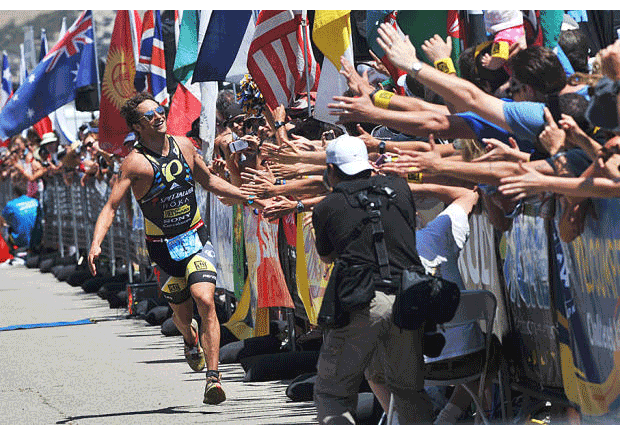
Volunteer Coordinator: This is the cornerstone of your organization. It is no coincidence that the late, wonderful Sharron Ackles —among the most successful RDs in the Hawaiian Ironman's history — started as that event's volunteer coordinator. If you can find the right person to do this job, you're already halfway to the goal. Who is the successful candidate?
She's got to be shrewd, well-spoken, gregarious, likeable, and maybe the smartest person in your organization. She has to be able to ask people to wake up at oh-dark-thirty and sweat all day long for a t-shirt, some yogurt, and half a banana. She's got to be a tireless worker. And no, she doesn't have to be a she, it’s just uncanny how often a man does this job with less skill and success than does a woman.
I like this as your first choice, because she's going to be able to help you fill out the rest of your team. You're going need her, because you aren't going to be able to pay anyone on your team, at least not until you can prove to yourself that this race can afford it, and you need someone who can help you make that case.
Information Technology Coordinator: You need a good race web site, and someone has to build it. You'll probably be using online registration, and this person will be the liaison between you and your online registration engine. This person will need to be able to format your results into a usable file for USAT (assuming you sanction), as your customers will want to have your race included in USAT's national rankings. Or perhaps the timing company you contract with will do that, but you need someone on your team that speaks that "language," and can make sure that stuff is going to get done. This person may well be your social media manager.
Transition Area Coordinator: You'll need someone to coordinate the construction of your bike racks, cones, chalk marks, barricades. This person will plan and execute the traffic flow into and out of your transition area. This can make or break you, and when you get your key course staff — swim, bike and run coordinators — together for your regular meetings, this person must be involved.
Site Manager: There are two elements to your main race site. Yes, there's the transition area, but there is also what we used to call, "The Look." Do you want your race to look good? To look professional? What will your finish line look like? And your swim start? Where will your announcers sit? Do you have sponsors, and if so, where will their banners and signage be? Where will you do awards? Will you have a podium for finishers?
Your "site" guy also controls your construction crew. If you're building anything, like a dais, or if your scaffolding contractor needs help, or your P.A. guys needs help, your Site Manager will have found out what the needs are beforehand and arranged with the volunteer coordinator for the appropriately trained volunteers.
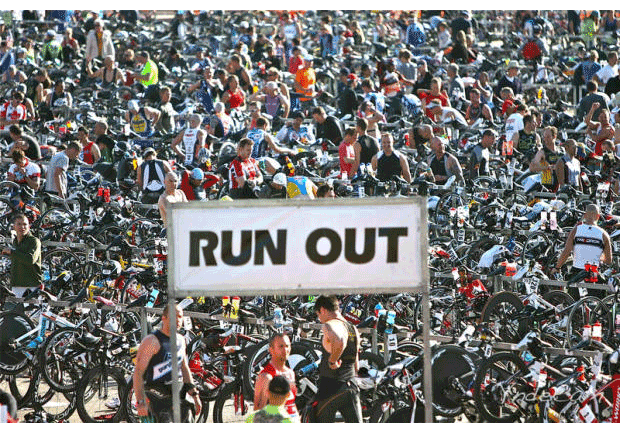
Clean-up Coordinator: Here's the dirty truth. If you don't arrange for a clean-up crew, you are the clean-up crew. I've discovered this on a couple of occasions.
Registration Coordinator: This person liaises with your registration company, that is, you've got to somehow get from online registration to actual bags that people can pick up with their race numbers. This person takes care of day-before registration, the waiver, waiver explanation, body marking, bag stuffing, accumulating other stuff that goes in the bags, getting bags, and all that. This is a big job, and requires a lot of coordination. You'll find that out the first time you've got to get all the numbers and goodies into 700 bags.
Aid Station Coordinator: This person makes sure everything that makes an aid station an aid station is what it's supposed to be, including the volunteers to man it. You can't imagine how often this gets messed up. Well, being triathletes, maybe you can. The biggest problems? Not enough water, not enough ice, fluid replacement doesn't show up, volunteers don't show up, and biggest of all: nobody's figured out in advance how to get the volunteers to their respective stations. Well, actually, no. The biggest problem is getting volunteers not to yell "Gatorade!" to passing runners when it's actually Infinit in the cup.
Swim Course Coordinator: This person will liaise with lifeguards, arrange to obtain the swim buoys, and to set the buoys, arrange for kayaks, paddleboards, balloons, start/finish banners, and so forth. Bad things can happen in the water. This person needs to know what he or she is doing, and more often than not this is a lifeguard, ideally a lifeguard employed by the jurisdiction in charge of guarding the body of water in which you're swimming.
Bike Course Coordinator: If someone is going get hurt badly at your race, it's more likely to be on the bike than anywhere else. Best, then, to pay special attention this element of your race. What corners need marshalling? Where ought cones to be? Is the course wide enough? Ought a lane be blocked? Where ought signs be alerting drivers that there are cyclists on the course? Who will make these signs, and place them? Who will pick them up when it's all over? Are routes to churches being blocked? Are there any unsafe corners or descents? Do the corners need to be swept? Who obtains the brooms? Who will sweep the corners? Is the course marked? Who will make sure the highway patrolmen are where they're supposed to be? Is there a media vehicle, or does the media need transport on the course? Are there course officials? Who will arrange for their transport on motorcycles?
I've listed about half of what a bike course coordinator does. This person is extremely important, because your customers will be going 20 to 40 miles per hour suspended a couple of feet off the ground by two very skinny patches of rubber, in close proximity to two-ton metal objects going twice that speed driven by absolute morons who'd have been swept from the planet long ago were it not for the artificial suspension of the rules of natural selection.
Run Course Coordinator: Sets and measures the course, figures out where aid stations go, works out your traffic plan for the run, marks the course, figures out road or lane closures, and what sort of resident notification ought to go out pre-race.
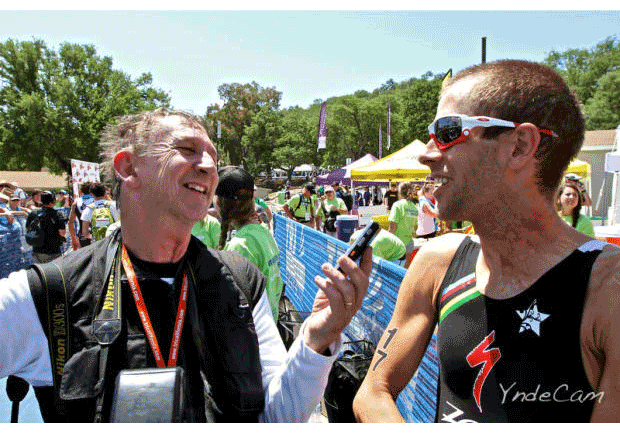
VIP Coordinator: You've got VIPs. Most notably and importantly, the people who are allowing you to put on this race: city council, mayor, all the department heads, and so forth. Then there are the sponsors. This is also where media is headquartered. Finally, there are certain invited athletes, perhaps their managers and also, in my view, prospective sponsors (things change, including your sponsors). You need a special tent or tents for all these people and a person, with a staff, to make sure these people have everything they need to feel comfortable. They need special food and drink, they need to get printed results in a hurry. They need badges. They need someone who'll get them directions to the course, badges and vehicle passes, before the event. They need to see a show, and they need someone who can help them see it.
Risk Manager: Simply put, you need an attorney. No problem. Many or most firms do pro-bono work. If I was an attorney and I needed to do a certain number of hours pro-bono, this is what I'd want to do. This ought to be a pretty easy person to get.
Why do you need a Risk Manager? Here are a few questions for you. Has your online registration engine got the right wording for the online waiver? Is the online waiver enough, or ought everyone to sign one in person? Can everyone read a waiver and just sign on one common page, or must each contestant sign an individual, personalized waiver page? Should the waiver's paragraphs be initialed, or is a signature at the bottom enough? How big should the type on the waiver be? Is there anything about this waiver that can render it subject to a pierce? How much insurance is appropriate? What are the insurance requirements of the sponsors, and the cities and jurisdictions you're passing through? Who needs to be named on the waiver? Which parties require certificates of insurance? Are you doing a pre-race bike and/or helmet check? Is the water safe? How do you know?
Do you feel qualified to answer those questions? If not, then get yourself a Risk Manager. This person ought to be familiar with the laws and recent decisions governing special events, and should also know something about insurance. Quite a few years ago USA Cycling went through the first half of the year covered by a policy written by a fraudulent party. America's governing body in charge of all sanctioned cycling races was essentially uninsured, and so were all its sanctioning race directors. You don't want that to happen. Your Risk Manager will take care of all this for you.

Adjacent you see an organizational chart, and the arrows represent those entities that are needed by other entities. For example, you'll see that almost everyone needs what the Volunteer Coordinator controls. Also, the Transition Coordinator is needed by the Swim, Bike and Run Coordinators, because he has to take their athletes from one event and in a streamlined fashion get them to their next event. The V.I.P. Coordinator needs the I.T. Coordinator to get results to the media and sponsors as quickly as possible in whatever format is appropriate (wouldn't it be nice to hand every sponsor, city father, and media a thumb drive just after the race with results and photos?).
Therefore, there are certain smaller committees who'll be comprised of various coordinators above, and they'll need to meet on a regular basis. For example, there ought to be a Traffic Committee comprised of you (if it's your race), the RD (if you're not the RD), and the Swim, Bike, Run and Transition Coordinators. These need to be specific meetings where the needs are shared. For example, everyone who needs volunteers needs to meet at a volunteer meeting, and then this group needs to meet a couple of more times to make sure volunteers are being acquired at an appropriate pace (and for the Volunteer Coordinator to be apprised if certain volunteers have been successfully recruited by the an individual coordinator, freeing up volunteers for other purposes).
Your race is going to require a lot of stuff. The Registration Coordinator needs race bags into which things will be stuffed (and the stuff to stuff them with), swim caps, chip straps, and black markers for body marking. The Aid Station Coordinator needs tables, pop-up tents, water bottles, cups, fluid replacement, large coolers or trash cans for mixing, trash bags for discarded cups and gels, and so on. Have each of your coordinators make a list of what they'll need, and don't rely entirely on that list. Go over that list in group meetings, so that everyone else can think of what might've been forgotten.
Don't wear out your staff with meetings, but figure out in advance just what meetings you do need, schedule them, and have specific reasons for those meetings.
The above is a bare-bones explanation of what sort of a staff I would require to put on a race. But that's just your staff. You'll also have contracted personnel, people you'll probably have to pay:
• Online registration
• P.A. system: this is separate from the announcer, this is what the announcer announces into.
• Announcer
• Scaffolding
• Bike racks, cones, etc.: You'll probably not own these, but rent them, or rent them along with the person who'll erect and take down all this stuff for you.
• Signage: You're going to need a signage guy. You'll need banners for your sponsors who don't have their own banners, you'll need maps of the course — both smaller printed maps and maps on big boards for people to look on at the race site. You'll need a start/finish banner, or separate ones for the swim start and race finish, and placards for the course such as "Caution Cyclists Ahead". Will you need to mail pre-race post cards to residents and businesses alerting them to course closures or inconveniences? Will you need laminated badges? Vehicle and parking passes? You see what I mean.
Then there's all the other stuff you've got to rent or buy:
• Portable toilets
• T-shirts
• Awards
• Swim caps
• Race numbers
• Aid station supplies
• And on and on… (we'll get to that)
Perhaps you can see why triathlons tend to cost a lot more than 10K races cost. "Wow, can you believe $125 and all I got was a t-shirt?" Sometimes some races aren't a good value, but the races I used to put on had all the stuff mentioned above and more, and I got a bit of flack for charging $65. Maybe my races didn't need all that stuff above. But I never had a serious injury or death at any of my races — knock on wood — and everyone got what was promised. I wouldn't put a race on with less than the staff and amenities above. Fortunately, people like to be a part of something fun and challenging like a triathlon. With a little work you can build a team of key coordinators, and you won't have to pay them money (unless your race gets very big, but by then you can afford to pay them).
One last thing. I didn't include a Marketing Coordinator in my list above. Your race will not be a success unless you hit the pavement and do a lot of grass roots marketing. I'll write about that next. Presumably someone on the flow chart above also takes care of that chore, but if not, draw another circle and add this person.
The Series:
• How to Be a Race Director
• Picking a Course
• Pacify the Locals
• Getting That Special Event Permit
• Assembling Your Race Committee
• Your Race Budget
• Traffic Plan
• Getting Volunteers
• Getting Sponsors
• Attracting Media
• Filling Your Race
• Aid Stations



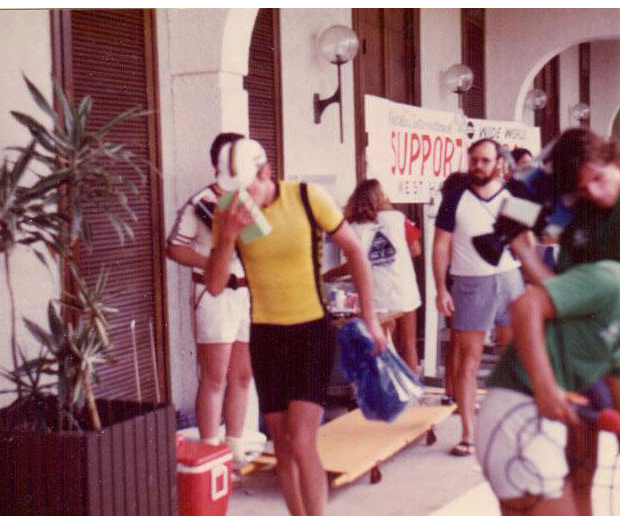
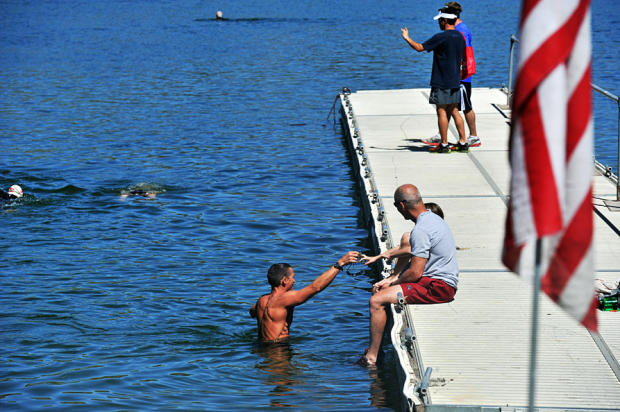
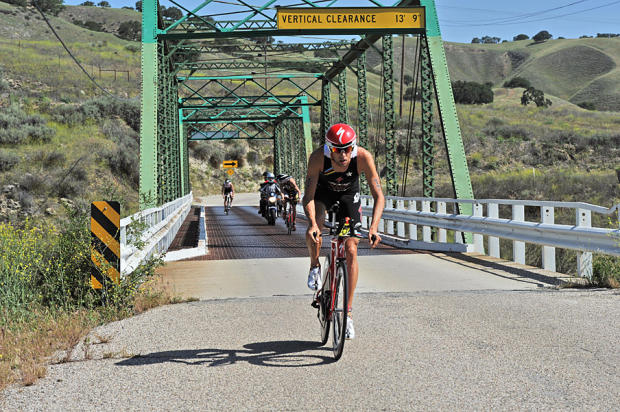

Start the discussion at forum.slowtwitch.com